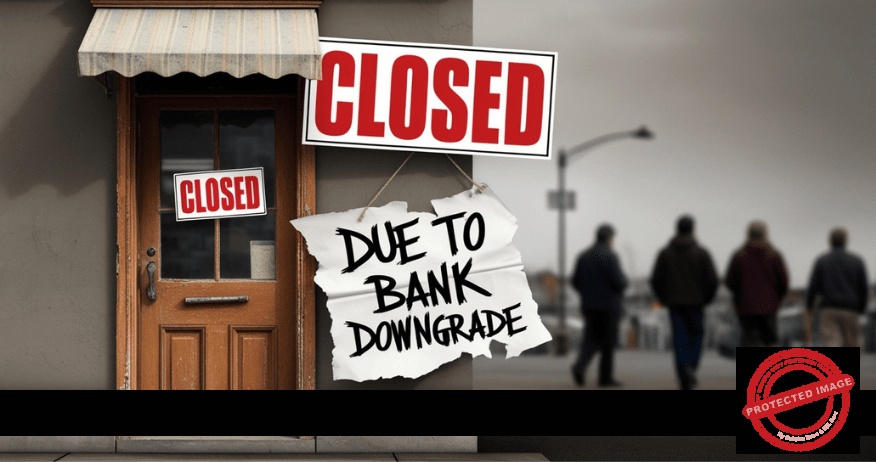Understanding the role of credit rating agencies in monitoring countries’ and banks’ ability to pay loans is crucial because downgrading bank ratings happens too often. When credit rating agencies downgrade a country’s credit rating, it will affect its banks and the people. This knowledge empowers you to expect and prepare for potential financial effects.
Affiliate Disclosure: This post may contain affiliate links – I may receive a small commission if you purchase through links, at no extra cost to you. Read HERE.
When a credit rating agency, like Moodys, lowers an issuer’s rating, it’s a red flag. The lowering of the ratings is what we call a credit rating downgrade. It’s a warning sign that the issuer, in this case, a bank, is at a higher risk of default. This cautionary downgrade signals to lenders, including the public, that lending to these banks now carries a higher risk, prompting them to be more vigilant in their financial decisions.
A country’s credit rating is linked to bank credit ratings. When a country’s economy is under strain, it affects the financial landscape, which affects people’s ability to conduct business, save, and borrow money. This interconnectedness underscores the importance of understanding and being part of the larger financial ecosystem.
Downgrading Bank Ratings of Kenya Banks
In the news, Moody’s has downgraded three top Kenyan banks. Someone should tell us the effects of the bank downgrading on small businesses owned by taxpayers. The downgrading of national banks in their ratings will affect many small businesses. Let us discuss some effects of this.
Credit Rating Agencies
There are many global credit rating organisations. However, the top three global credit rating agencies are:
- Moody’s
- Standard and Poor’s (S&P) Global
- Fitch Rating
The three agencies use a combination of social, political, and economic factors to determine the capacity to service current and future debt obligations for banks and countries.
Meet Sam, a Taxpayer Business Owner
Meet Sam, a taxpayer and one of the business owners who may be affected by the downgrading of bank credit ratings. As a small business owner, Sam loves what he does: helping his community in his local grocery store. Sam works hard every day to keep his business running smoothly.
But this week, Sam heard some troubling news: the credit rating agencies downgraded the credit rating of three top banks in the country because of a weakened country’s credit profile.
Like every other small business owner and taxpayer, Sam wondered how this would affect his business and customers. If you are curious, like Sam, let us explore how downgrading the top three commercial bank ratings may affect small businesses and taxpayers in the country.
Effects of Downgrading Bank Ratings on Businesses
Higher Borrowing Costs
Sam’s first concern was about his business loans. When a bank’s rating is downgraded, it will face higher interest rates or pay more to borrow money. To cover these costs, the bank will raise the interest rates on loans to its borrowers and personal and business loans. Some banks may also raise the interest rates on any outstanding loans.
For Sam, this means that he may have to pay more interest on a loan he had taken last year to expand his store. The higher interest costs will make it difficult for Sam and other small businesses to grow. In his expansion plan, Sam had planned to use a bank loan to add a new section of his store and start selling cereals.
The higher interest rates now mean his loan repayments will be more expensive. The expenses will eat into his profits and make it difficult to afford the expansion. For many small business owners like Sam, higher borrowing costs will put any growth plans on hold, limiting their ability to compete in the market.
Reduced Credit Availability
Banks with lower ratings might become more careful about lending money because they want to avoid risks. Hence, less money is available for loans. This will affect Sam and should worry him about getting any new loan. If Sam had plans to open another store or buy new equipment, he might need help to get the loan he requires from the banks. Reduced credit availability will slow down business expansion plans and affect the economy.
Sam’s friend Lisa, who owns a bakery, also shared her concerns. She had previously gotten a loan from the banks and struggled to repay the loan, but she eventually paid off the loan. She planned to purchase a new oven to increase her baking production. However, with the bank’s credit rating being downgraded, she suspected the banks would also tighten customers’ credit ratings.
Lisa hoped she might get the loan she required. For many small businesses like Lisa’s, access to credit is crucial for their day-to-day operations and growth. When banks are more cautious, this will stifle innovation and limit opportunities for expansion for the business and the economy.
Increased Loan Repayments
Sam also thought about his existing loans. If his loan had a variable interest rate, the payments could go up when the bank’s rating goes down. Sam might have to pay more every month, squeezing his budget. Increased loan repayments can make it harder for businesses to manage their finances and plan for the future.
For instance, Sam’s monthly loan repayment could increase by a few hundred dollars. While this might seem like little, it adds up over time and could affect his ability to hire new workers or new products. This financial strain can be challenging for small businesses that operate on thin margins.
Decreased Investor Confidence
Sam’s friend Emma had promised to give him some money. Emma lives abroad and is an investor supporting local businesses with small cash and no interest. All she requires is the money to be paid back to her. She told Sam that the downgrade of banks can make many investors like her nervous.
The investors might worry that their investments are at risk and decide to put their money elsewhere. Decreased investor confidence can lead to less funding for businesses like those funded by Emma, making it harder for them to thrive.
Emma had been considering investing in Sam’s grocery store to help him expand. But the news of the bank’s downgrade made her hesitant. Given the potential credit risk, she was still determining if it was the right time to invest. This hesitation can decrease capital for small businesses like Sam’s, hindering growth and development.
Impact on Business Operations
With the bank’s downgrade, debtors must pay more for their loans. This made Sam realize that if he had to pay more for a loan, he had and could not get any new loan; he might have to make some tough choices. He could only buy new stock for his shop, reduce his staff (he currently has two), or put any planned store improvements on hold.
These changes will affect his customers, the products he can offer, and the quality of service. The effect on business operations will ripple through the community, affecting many people.
Let us look at an example of some effects. If Sam waits to buy new stock for his shop, his customers will notice a need for more variety of products. If he lays off his staff, the service might continue, leading to longer wait times and a less pleasant shopping experience. These operational changes will negatively affect customer satisfaction and loyalty, and customers may move elsewhere.
Lower Consumer Spending
Sam noticed some customers were also worried about the bank’s downgrade. If they had loans or credit cards with the bank, Sam knew that they might have to pay more in interest. That meant they might have less money to spend on groceries and other essentials than what he was selling. It is a fact: lower consumer spending can hurt local businesses and make it harder for them to stay afloat.
For example, Sam’s regular customers, like the Johnson family, might reduce their grocery spending if they pay more interest on their car loans. The decrease in Johnson’s family spending will lead to lower sales for Sam and other local businesses. The low expenditure will make it harder for companies to maintain their operations.
Financial Market Volatility
Finally, Sam heard an interview response on the streets on the news that downgrading commercial bank ratings can cause financial markets to become unstable. The person responding explained that share prices might drop, and people’s investments could lose value. The financial market volatility can create uncertainty and fear, making it hard for businesses and taxpayers to plan for their future operations.
For Sam, this means that his retirement savings, which were invested in the share (or stock) market, could be at risk. If the market became unstable, the value of his investments could decrease, affecting his financial security. The broader economic uncertainty in the country can have ripple effects. This will probably affect every taxpayer, from small business owners to individuals.
Those are the seven potential effects of international credit rating agencies downgrading a commercial bank’s credit rating. These are not the only potential effects; there are many more.
Conclusion of Downgrading Bank Ratings
Sam’s story shows how downgrading commercial bank ratings can affect everyone in the community and country. The effects of higher borrowing costs and reduced credit availability can be significant. Businesses like Sam’s might need help to grow, and consumers might have less money to spend.
By understanding these effects, everyone, including taxpayers, can be better prepared to face future financial challenges. Remember, staying informed and planning can help businesses and taxpayers navigate challenging times.
Thank you for reading the article. Let us know your thoughts in the comments
Dr Wakaguyu
taxkenya@gmail.com



